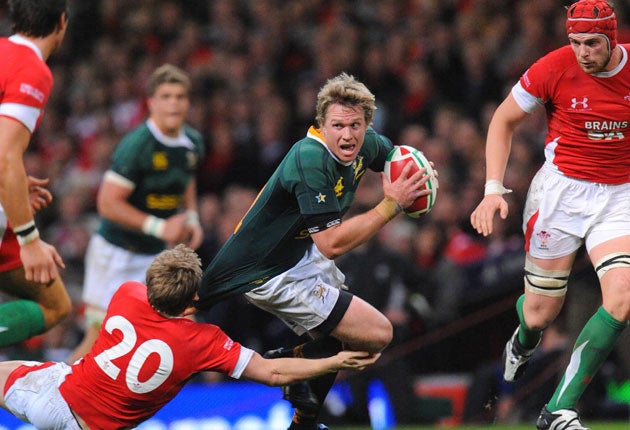Peter Bills: On the Springboks win in Wales

Until South Africa decides definitively which style of rugby it wishes to play in the Peter de Villiers era, I suspect we will continue to see the kind of muddled performance which undermined the Springboks’ ambitions and aspirations in Cardiff.
It was clear from listening to the words emanating from the Springbok camp during the week that in the minds of some senior players, a return to practicalities was uppermost in their thoughts. For the first 40 minutes, this belief was reinforced by the style the ‘Boks employed.
Yet when the situation called for an even tighter approach to shut Wales out of the game completely, it was as though the players felt unable to do it. After all, their coach has preached a philosophy of creativity, attacking intent and ambition and the Springboks clearly believed they couldn’t abandon such an approach entirely.
What we were left with was a kind of halfway house, a hybrid in which neither the real attacking stuff that de Villiers always promised nor the ruthless, powerful forward approach which hallmarked the Jake White era, prevailed. In between the two, lay muddle and uncertainty. There was the sight of some players trying to run, others kicking, more still unable quite to decide which way to veer.
It explained why this was merely the latest of a series of stuttering performances by South Africa since their World Cup triumph 12 months ago. Apart from two runaway wins against seriously disinterested opposition in Argentina and Australia earlier this year, the Springboks have looked only occasionally a side worthy of the title ‘world champions’.
Resolving the difficulty may not be easy. Either de Villiers declares his original concept flawed and impractical or he jettisons the senior players who have clearly become less and less enchanted with the idea as 2008 has unfolded. Whilst they stay, it seems unlikely they will embrace completely the philosophy originally espoused by their coach in his early days. Therefore, a compromise is required but is that practical?
A fully firing South African side would have made Wales melt on Saturday, once they got ahead by 20pts to 3. By the standards of the northern hemisphere, Wales are not a bad side yet they lack the cutting edge which marks out winners from losers at the highest echelons of world rugby.
Yet from that high water mark, South Africa stumbled and declined so alarmingly that they were left hanging on in the final minutes, Wales searching for (and going close to finding) what could have been the winning score. This simply isn’t good enough for a squad of South Africa’s class and talent.
As too often in the Tri-Nations season, too many Springboks were guilty of mediocrity. There were some good moments individually but the whole never began to resemble the sum of the parts. If the theory of contrasting philosophies is not the case, and you can bet the Springbok camp will rubbish it (they would, wouldn’t they) then we are entitled to hear proper explanations for this poor show.
Skipper John Smit revealed that at 20-3, he told his troops to “make it happen” from there. But thereafter, for some reason, he said, they couldn’t get out of their own half.
But what reason? South Africa had established the platform, the base from which they ought to have amassed 40 points. That they never even looked like doing so should be a cause for considerable concern among their followers.
Scotland in Edinburgh this Saturday won’t represent a serious challenge to the tourists, indeed probably less so than the Welsh Test. But England at Twickenham could, although the disparity in experience between the two nations at this time is immense. The Springboks shouldn’t be troubled by anyone in this part of the world and to have allowed Wales to go so close when the trapdoor was creaking beneath them, defied logic.
Explanations are required for this state of affairs.
Subscribe to Independent Premium to bookmark this article
Want to bookmark your favourite articles and stories to read or reference later? Start your Independent Premium subscription today.

Join our commenting forum
Join thought-provoking conversations, follow other Independent readers and see their replies